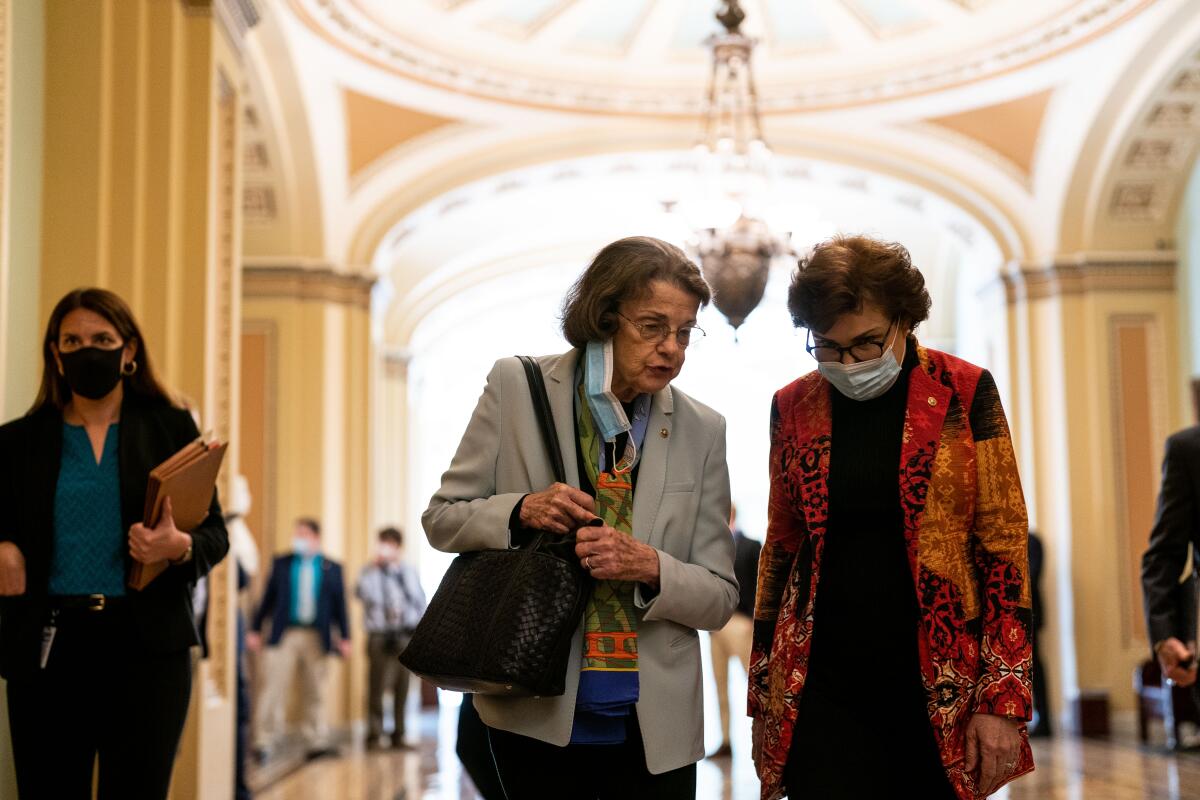Feinstein defends herself amid new questions about her capabilities in Senate job

- Share via
WASHINGTON — Sen. Dianne Feinstein pushed back Thursday on a news report that renewed questions about her age and capacity to fulfill the job responsibilities of the Senate.
The San Francisco Chronicle reported that four senators — including three Democrats — and one Democratic House member said that Feinstein’s memory was rapidly deteriorating and that it appeared she could no longer fulfill her job duties without her staff. Three former Feinstein staffers made similar claims.
None of them agreed to be identified, but the story comes after two years of chatter on Capitol Hill about Feinstein’s mental capacity to do her job.
After the Chronicle posted the story, Feinstein, 88, said in a statement that “the real question is whether I’m still an effective representative for 40 million Californians, and the record shows that I am.”
While she said she focused much of the last year on husband Richard Blum’s illness and death, “I have remained committed to achieving results, and I’d put my record up against anyone’s.”
The statement said that Feinstein (D-Calif.) led the reauthorization of the bipartisan Violence Against Women Act, “secured more direct government funding for my state than any other Democratic senator other than the chairman of the Appropriations Committee and secured additional funding to retain federal firefighters to help California prepare for the upcoming wildfire season.”
Feinstein is almost always trailed by staffers while walking around the Capitol, and staffers frequently interject on her behalf when the senator gets questions from reporters.
When asked recently about the troubled nomination of Los Angeles Mayor Eric Garcetti to be ambassador to India, she declined to comment, saying she wasn’t up to speed on the details.
On the day of Gov. Gavin Newsom’s recall election in September, she declined to answer any questions about what it may mean about her own political future. Some Democrats speculated that Feinstein would face pressure to step down if a Republican had beaten Newsom. During the conversation in a Senate hallway, she then asked an aide whether the election was that day.
The Senate has no age cap, and it has occasionally wrestled with questions about whether some of its aging members were able to do the job.
Many senators, while privately acknowledging Feinstein’s memory lapses, have been reluctant to publicly comment on the situation, in deference to her groundbreaking political career.
Sen. Alex Padilla (D-Calif.) and House Speaker Nancy Pelosi (D-San Francisco) issued on-the-record statements to the Chronicle defending Feinstein.
Feinstein is the oldest sitting senator.
“I always felt that the Senate and the U.S. Congress were made for older people in that the longer you stay there, the more power you have,” said Jimmie Woods-Gray, a Los Angeles activist and longtime Feinstein supporter, who also serves as president of the L.A. Fire Commission, a civilian oversight board.
“I think her age and her wisdom and her knowledge of the Senate from having been there for so long is good for us,” she said in an interview. “People don’t understand that if you put a new senator in there, how many years it’s going to take us to get back to a position of influence. It’s going to take a long time.”
In recent years, Feinstein has faced growing pressure from progressives in the Democratic Party to relinquish some of her power.
In late 2020, Feinstein took herself out of the running to lead the Senate Judiciary Committee amid worries from other Democrats about her ability to fill the high-profile job and fight for President Biden’s judicial nominees.
After several years of Republicans confirming Trump administration judges despite the objection of Democratic home-state senators — ending the practice of recognizing “blue slips” — Feinstein said in a brief interview that she wasn’t aware of the problem.
“I have never heard a problem. No one has — in 26 years — brought me a problem on blue slips,” Feinstein told The Times. Her office had repeatedly issued statements deriding the Republicans’ practice.
Feinstein’s decision to step down from Judiciary came after fellow Democrats quietly went to Sen. Charles E. Schumer (D-N.Y.), on the cusp of becoming majority leader, with worries she couldn’t handle the job.
Feinstein’s term is due to end in January 2025. If she were to resign early, Newsom could name a replacement.
In March 2021, Newsom said he would replace Feinstein with a Black woman, if the opportunity arose. Feinstein responded by saying she intended to serve out her term.
More to Read
Get the L.A. Times Politics newsletter
Deeply reported insights into legislation, politics and policy from Sacramento, Washington and beyond. In your inbox three times per week.
You may occasionally receive promotional content from the Los Angeles Times.












